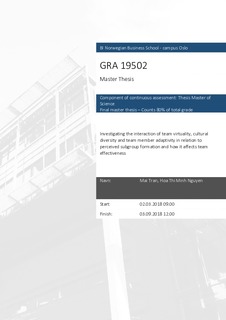Investigating the interaction of team virtuality, cultural diversity and team member adaptivity in relation to perceived subgroup formation and how it affects team p formation and how it affects team
Master thesis
Permanent lenke
http://hdl.handle.net/11250/2578655Utgivelsesdato
2018Metadata
Vis full innførselSamlinger
- Master of Science [1621]
Sammendrag
This study aims to examine the interaction of virtuality, cultural diversity,
and team member adaptivity in relating to team effectiveness, and the role that
perceived subgroup formation plays in mediating these relationships. We propose
that perceived subgroup formation is negatively associated with team
effectiveness and that, virtuality as measured by working virtually (proportion of
time spent working face to face vs. other media), working asynchronously
(proportion of time spent working through non-simultaneous communication),
and member virtuality (dispersion of members across different locations) is
positively associated with perceived subgroup formation. Further, we propose that
cultural diversity, as measured by differences in individualism scores between
team members, interacts with virtuality in a way where perceptions of subgroup
formation are strengthened, and thus has a negative influence of team
effectiveness. On the other hand, we propose that team member’s interpersonal
adaptivity are negatively associated with perceived subgroup formation and
interact with cultural diversity and virtuality as well in relation to perceived
subgroup formation.
Regression analysis on a sample consisting of 174 employees engaged in
virtual teams was conducted. The results show that there is a positive relationship
between virtuality and perceived subgroup formation, but we found no significant
relationship between perceived subgroup formation and team effectiveness.
Furthermore, cultural diversity did not amplify the positive relationship between
virtuality and perceived subgroup formation, nor did interpersonal adaptivity
weaken the relationship. The result, however, did show that team member
interpersonal adaptivity has a positive relationship with team effectiveness.
Implications and suggestions for future research are also discussed.
Beskrivelse
Masteroppgave(MSc) in Master of Science in Leadership and Organizational Psychology/Master of Science in Business - Leadership and Change - Handelshøyskolen BI, 2018
